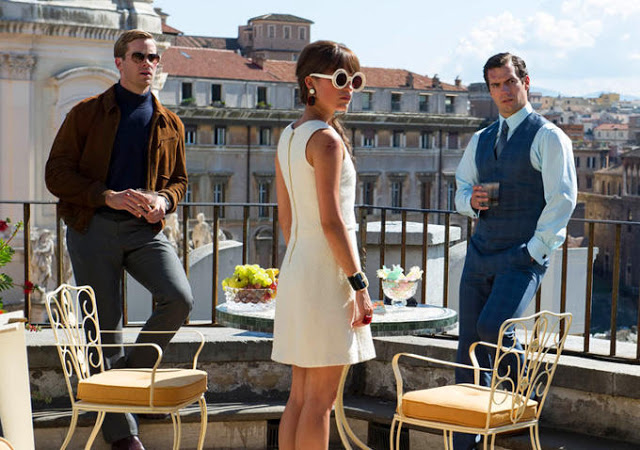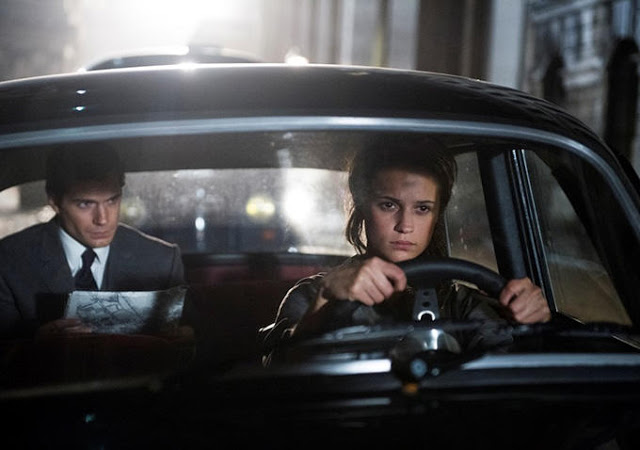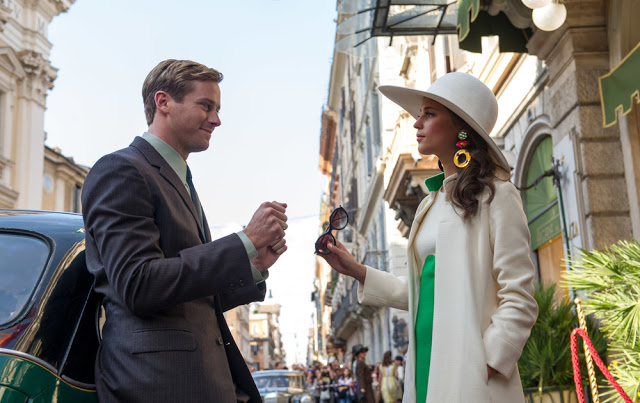It is telling that the best scene in The Man from U.N.C.L.E., Guy Ritchie’s fun and frivolous update of a forgotten ’60s spy show, involves a man quietly helping himself to a sandwich. That would be Napoleon Solo (Man of Steel‘s Henry Cavill), a crack thief-turned CIA agent who, during the scene in question, finds himself fleeing from angry German sentries after breaking into a heavily guarded warehouse. He begins the sequence—along with his grudging partner, KGB operative Illya Kuryakin (The Social Network‘s Armie Hammer)—attempting to outmaneuver ‘ze Germans on a speedboat, but during the chaos, he gets thrown overboard. Any reasonable movie would keep the focus on Kuryakin, hurtling alongside him as he evades his pursuers through heroism and ingenuity. Instead, Ritchie stays with Solo as he calmly finds his way to a pickup truck, where he happily discovers a Little Red Riding Hood-like basket of goodies. As Solo uncorks a bottle of wine and carefully tucks in a bib, the boat chase featuring Kuryakin rages on in the background, orange flames silently erupting into the black night sky. Yet only after savoring a bite of his stolen sandwich, then emitting a weary sigh of annoyance, does Solo come to his partner’s aid.
This is a very funny scene, but it’s also illustrative of Ritchie’s commitment to lightness as a mode of storytelling. To say he favors style over substance almost gives him too much credit. What really matters to him is buoyancy, which is why The Man from U.N.C.L.E. floats along in a state of perpetual ease and winking insouciance. Evoking a James Bond picture from the Roger Moore era (there is even a spectacularly cheesy double entendre), it is difficult to imagine a spy film less interested in generating danger or suspense. It’s pointless, but at the same time, it persuasively suggests that having a point is overrated.
The plot, not that it remotely matters: It is 1963, the heat of the Cold War, and Solo and Kuryakin must work together to prevent a group of extremists from obtaining a nuclear warhead. (The great Jared Harris plays Solo’s gruff American boss, presumably just so he can try out a Yankee accent.) Their point of entry is Gaby Teller (Alicia Vikander), a German mechanic whose father worked unwillingly as a scientist for the Nazis during World War II. Solo and Kuryakin intend to use Gaby’s familial connections to infiltrate the terrorist faction before the baddies get their hands on enriched uranium and things go boom.
This setup is perfunctory, but its execution reveals The Man from U.N.C.L.E. as a classic oil-and-water, buddy-cop comedy. (Whether this resembles the original TV show, I can’t say; prior to watching this movie, my sole knowledge of the source material involved Sally Draper masturbating to it.) Solo, a cross between Bond and Ryan Seacrest, is the cavalier sort who seems just as comfortable shopping for clothes as firing pistols. Kuryakin, in contrast, is an ostensible brute, the type of inhumanly strong creature who could be a Bond villain, if he weren’t playing for the good guys. Much of the movie’s pleasure derives from these two beautiful men fighting, collaborating, bickering, and possibly flirting. It’s a romance without the sex, and The Man from U.N.C.L.E. is like whipped cream without the sundae.
Which is not entirely a bad thing—whipped cream, after all, can be awfully tasty. Besides, the absence of story here is hardly unprecedented for a contemporary would-be franchise-starter, in which the plot tends to serve as the mere skeleton on which the popcorn elements are layered. What’s strange about The Man from U.N.C.L.E. is that the action sequences themselves also feel irrelevant. Sure, there’s a lengthy, depressingly dull three-way vehicle chase near the end of the film involving a motorcycle, a Humvee, and a dune buggy, but for the most part, this movie is static rather than kinetic. (The exception is the film’s invigorating opening set piece, a cunningly choreographed car chase that’s more notable for its guile than its speed.) This does not mean that it is entirely lethargic—more that it is in no hurry to move its characters anywhere in particular. Ritchie is less interested in whirring spycraft than he is in interpersonal dynamics, primarily the game of cocky one-upmanship perpetually being played between Napoleon and Kuryakin.
It’s a refreshingly honest approach. If directors aren’t going to bother with filmmaking fundamentals like plot and character—and The Man from U.N.C.L.E. is concerned with neither of these things—the least they can do while they’re bilking us of our dollars is to make sure we enjoy ourselves. And let’s face it: For all its flimsiness, this movie supplies a healthy amount of fun. There is a dedication to frothy pleasure here that, in its own blithe way, is almost daring. If you want depth and intrigue, go watch The Americans. But if you’re interested in light, amiable entertainment, pull up a well-appointed chair.
Not that The Man from U.N.C.L.E. is necessarily expertly crafted. Ritchie is, without doubt, a relentless stylist, but that doesn’t make him a great one. His pet editing trick, which he also employed in Sherlock Holmes (and its inferior sequel, also featuring Harris), involves rushing through a series of events, then quickly hopscotching back through time to illustrate how the culminating event (an explosion, a theft) came to fruition. It’s a clever ploy, but it suffers from diminishing returns, as does his self-congratulatory gambit of shunting plot points to the background of the frame. (The boat chase-cum picnic is terrific, but Solo and Kuryakin conversing quietly in the foreground while a man helplessly burns to death behind them is less amusing.) He is also weirdly enamored with the use of split-screen without really capitalizing on the technology, instead just senselessly fracturing the image into a number of choose-your-adventure panels.
But even if Ritchie is not entirely in control of his artistic impulses, he still wields them in the proper spirit, namely, supreme indifference. In this, he receives a valuable assist from Cavill, a Brit who seems much more at ease playing a superagent than Superman, gliding through the movie with a perpetual smirk. His comfort portraying Solo makes one sympathize with Hammer, who gracefully mines the physical comedy from Kuryakin’s bestial build but is clearly trying very hard in the process. Both men, however, are really supporting actors in service of Vikander, the effortlessly charming Swede who, continuing her 2015 breakout that began with the Australian crime flick Son of a Gun and continued with the sensational Ex Machina, is the only member of the cast who generates actual pathos. In a movie concerned entirely with surface pleasures, she sneaks under your skin.
But she’s the outlier, and that’s fine. Really, who cares about burrowing deep when the film’s villainess (Elizabeth Debicki, slashing scenery with her pale-blue eyes) sashays across the screen in a clingy black-and-white yin-yang dress? (All of Joanna Johnston’s costumes are excellent, which is fitting, given that Solo and Kuryakin are both stingily obsessed with fashion; in one sly exchange, Solo admonishes Kuryakin for wearing a bow tie that clashes with his suit, followed by a smash cut to Kuryakin, in a different location, now wearing a necktie.) That’s the level of superficial panache that The Man from U.N.C.L.E. earnestly embraces—everything else just feels incidental. At one point, Kuryakin delivers a perfectly placed punch to the neck of an oblivious foe, one that renders him unconscious but nevertheless leaves him perfectly upright and paralyzed. It gets a belly laugh, but it’s also a metaphor for Ritchie’s filmmaking philosophy. Watching this movie, you will feel the force of his style, and you will admire his devotion to detachment. Just don’t expect to be moved.
Jeremy Beck is the editor-in-chief of MovieManifesto. He watches more movies and television than he probably should.



